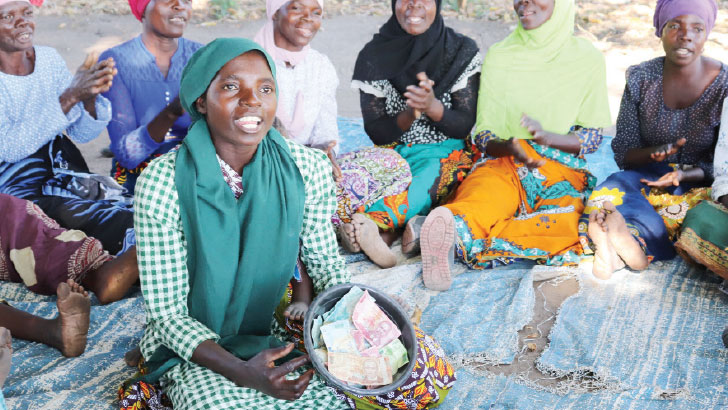Women’s war on poverty
Financial independence makes a household more dignified than strugglers who survive on alms.
Beatrice Banda, from Traditional Authority Mkumbira in Nkhata Bay, knows what living hand-to-mouth entails.
With no business, the 34-year-old woman had to survive on slavish piecework.
“Life was hard,” she says. “Working in neighbours’ fields and washing their clothes, I couldn’t earn enough to feed my family.”
Her crop harvests kept waning as she could not afford fertiliser and spent more time tending to her neighbours’ fields than her own.

Litness Msukwa says hunger and poverty made life hard for most people in Mzizimanga Village.
“A hungry people cannot adequately contribute to development,” says the mother of four. “Instead of lifting themselves out of poverty and taking part in development initiatives, they have to search for food and money.”
The hardship led to the formation of Vitumbiko Village Savings and Loans Group comprising 18 women and one man.
The club members pool their savings and give each other soft loans for businesses to improve their livelihoods.
Msukwa leads the group founded in September 2019. Just after a year, it received support from the Development Aid from People to People (Dapp) under the Financial Access for Rural Markets, Smallholders and Enterprises (Farmse) programme to lift the poorest of the poor out of poverty.
The poverty reduction initiative is putting vulnerable and ultra-poor beneficiaries on a path to self-sufficiency and sustainable development through community-based financial organisations and small-scale enterprise development. The project funded by the International Fund for Agricultural Development (Ifad) through the Ministry of Finance targets 1 500 community-based farmers organisations in Nkhata Bay and Nkhotakota along the shores of Lake Malawi.
“The project has a unique focus on increasing access to sustainable and diversified financial services to support poor and vulnerable small-scale farmers to improve their socioeconomic well-being,” says Dapp project manager Johstone Chitupira.
Vitumbiko club members now manage their group and businesses better.
“When Dapp arrived, our club already had a constitution to guide our operations, but we revised it to improve the way it is run. We formed an executive committee, supporting subcommittees and a two-year action plan to ensure we don’t lose direction,” Banda.
Currently, each member buys shares worth K500 to K2500 unlike previously when share prices varied from time to time.
Their collective savings are growing too.
“We shared about K1.2 million at the end of last year, but we surpassed that amount by June—six months to the end of the current cycle in December,” says Msukwa.
The loans group finances both private and group businesses. Together, they buy and resell rice, sugar and vegetables to grow their savings.
“Apart from selling these goods for profit, we own a vegetable garden to increase our financial muscle,” says Msukwa.
In the growing season from November 2020 to April this year, the club bought rice worth K800 000 for sale in the lean period that coincides with the rainy months at the peak of farming .
Currently, Vitumbiko is finalising its partnership with NBS Bank to enhance access to business loans. They resolved to obtain a K900 000 loan to boost their personal and collective businesses as required by their action plan.
They also plan to buy a lorry for hauling business commodities, grow more rice for sale, venture into pig farming and buy motorcycle taxis.





